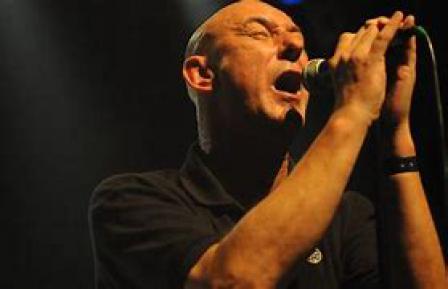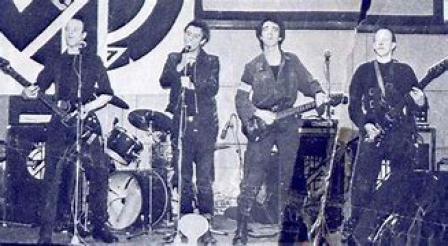
Following last month’s article on Bob Vylan, it makes sense to draw the line between what they are presently doing and what came before.
One of the most important aspects of the punk rock revolution of the seventies was the liberation it provided. Liberation in music. Liberation in fashion. Liberation in art. It kicked open doors and ushered in a new dawn of excitement and opportunity for those willing to embrace it. However what practical purpose did it have?
A consortium of like-minded folk was formed by two individuals wanting to adopt the liberation punk provided. And use it. They created a vehicle allowing music and art to be more than entertainment. To try and effect change. And moreover, they did it themselves. DIY punk rock. Without the hindrance of a record company contract. Or a Svengali-style manager. A lifestyle was created, which operated independently. People were encouraged to join. It showed what could be achieved and the freedom it could provide.
It could be used as a way of getting a point of view across. It allowed anarchism as an ideology. Not something a record label would really allow. Labels may allow a band to have the odd slogan here and there, but not the advocation of direct action. Too risky.
Crass had no such worries.
The founders of Crass were Penny Rimbaud and Steve Ignorant. Ignorant, originally Steven Williams, was born in 1957. Penny, thirteen years older, was already part of the counter-culture scene. This helped in their working relationship, and balanced Steve’s youthful exuberance. Rimbaud had been through it all before. He co-founded the Stonehenge Festival with Wally Hope (AKA Phil Russell) in the early seventies. This could clumsily be termed a ‘hippy festival’. Not someone an angry young Clash fan in 1976would necessarily align himself with. Russell was subsequently incarcerated in a mental institution for possessing a small amount of LSD. He died after his release. Penny suspected foul play. He was angry. The establishment and system were the enemy and it was time to wage war.
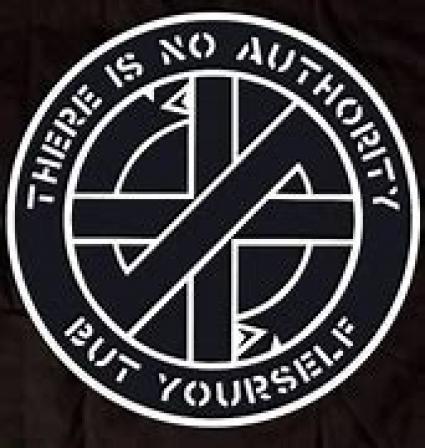
On the face of it, the partnership of Steve Ignorant and Penny Rimbaud was an unlikely one. But quite ‘punk’. As in doing exactly what you want, and with who you want. A uniting of kindred spirits, as it turned out.
‘Joe Strummer said, ‘If you think you can do better then go and start your own fucking band.’ So, I thought, brilliant.’ Steve Ignorant, Freq, 2011.
Steve’s mates in Essex, England weren’t into the idea, so he went to Dial House, a commune where Penny was based. He agreed to play drums in Steve’s band. Crass. Other residents Andy Palmer, Joy De Vivre, Pete Wright, Eve Libertine and Steve Herman soon joined, and the foundations were in place.
‘They would learn from me. I would be like ‘why are you being so wordy? Why use ten words when you can just say fuck off?’ – Steve Ignorant.
Crass helped invent DIY punk. And inspired millions. The fore-mentioned Bob Vylan being the latest. Bobby Vylan even wore a Crass t-shirt in the promo film for We Live Here.
Crass had no restriction on their actions. It had a large element of anti-consumerism, no pandering to the masses. Individual empowerment was encouraged. Alternative methods of expression and the co-ordination of activities were employed, whether it be promoting a new record release or planning an animal rights protest, for example. All requirements very relevant in 2020, as things have turned out. No-one can rely on anyone, anymore. You have to do it yourself, and have to find a new way. Crass appear to have had genuine foresight, even if the approach was ramshackle at times -
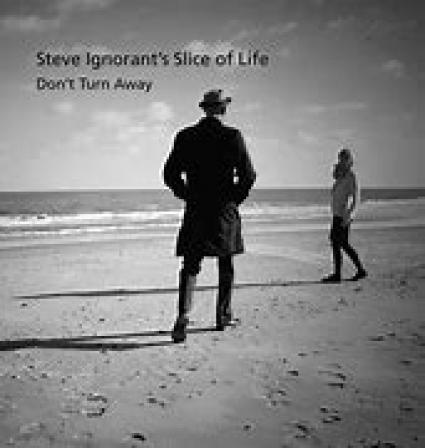
‘I think one misconception that people may have is that we deliberately started the DIY scene and we didn’t, you know? We just used what we had around us. The banners were made of old bed sheets, we painted everything black because that was what we had in the shed.’ Steve ignorant, Bad Feeling, 2017
Whatever the reason, the invention was there. DIY punk was born.
Anarcho-punk swiftly followed. Anarchism was already part of England’s counter-culture scene. However, the punk revolution unleashed a new stream of anger which needed a home. A proper one, not just something hanging on to the coat tails of the Sex Pistols and The Clash. It had to have meaning, especially lyrically. When Steve belted a barrage of words, those lyrics demanded further investigation. How can someone sound so genuinely angry? Spitting rage, succinct messages. Again, inspirational. Bob Vylan do the same.
And then there was the sound of Crass. The band’s screeching guitars sounded threatening. They were razor sharp. Not always easy on the ear. They couldn’t be any other way. Yet there were moments of tranquility. Moments of barren, slightly erring beauty.
Crass were one of the most ‘punk’ of punk bands. Punk as in the liberating, free and open art form. The kind of art form that says what it feels and acts from a blank canvas. There were already signs in 1978 of punk rock ‘posing’ after its initial hurricane. Certain protocol became expected of bands. The music industry wouldn’t totally subscribe to punk rock principles and expected its bands to follow suit. Be punk, but on our terms, would be one way of putting it. The Punk Police were also beginning to appear.
Crass resented all of this. DIY not EMI, indeed. Check Banned from the Roxy -
‘They said they only wanted well behaved boys
Do you think guitars and microphones are just toys?’
Words can be weapons. If such a legendary punk venue as The Roxy didn’t like them, and barred them (apparently due to a drunk performance), then…
‘Fuck ‘em, I’ve chosen to make my stand
Against what is wrong with this land.’
Crass’s debut album, The Feeding of the 5000, left a calling card like few others. It was released on their own label, Crass Records, in 1979. Checking in at just over half an hour, it is a collection of as sharp and intense punk rock ammunition as has ever been created. It still sounds fresh, and relevant, to this day. Particularly this day, in 2020. Whether this latter quality is a result of lyrical foresight or the world’s failure to resolve fundamental issues is open to debate. A bit of both, maybe. The opening track on their debut album is a poem, Asylum. Decrying Christianity in institutionalized form. It still has a lot to answer for. Spoken by Eve Libertine, one of two women in the band. At a time when punk rock was a male dominated domain, Crass didn’t just sing about feminist causes. They walked and talked them. And Do they owe us a living? related to your everyday life. Like it or not, it went for the jugular.
The band’s work ethic was staggering. Seven albums in five years. Countless shows. Plus the work involved in DIY punk. A double album with Stations of the Crass. The classic Penis Envy. Though all the tunes on Penis Envy were sung by Eva Libertine and Joy De Vivre, Steve was credited as ‘not on this recording’ but still a member of Crass.
Steve and Crass were subjects of a dossier held by MI5. They were in good company, being alongside Dead Kennedys and Throbbing Gristle in this respect. Margaret Thatcher’s government did not like agitators and they fell firmly into that category.
However, by the time of the UK Miners’ strike in 1984, Crass were burnt out.
‘It felt as though if another war broke out, Crass would be expected to write an album about it.’ Steve, Freq, 2011.
Penny claimed it was always the plan that Crass would end in 1984. Steve’s opinion differs. Whatever, it was clear time was up for one of the nation’s, and Punk Rock’s, most important bands.
What they had created was to live on, however. There was more to Crass than just the band itself. The subculture they formed with its DIY ethos. Their record label. It’d begun in earnest not only with the band’s own releases, but also the Bullshit Detector series of compilations.. One band who had their first EP released on Crass Records was Conflict. Another anarcho-punk band, strong on animal rights and anarchism. Following his band’s split, Steve joined Conflict on stage on occasions and eventually became a second vocalist with Conflict from 1987.
In the meantime, the DIY culture became a considerable force in the early nineties. A combination of political and ideological activism helped a new free party scene emerge, leading to the formation of organized movements such as The Exodus Collective. Gatherings, raves, parties, free festivals became prominent. The numbers got larger and larger at these events. Once again the conservative government were alerted. They didn’t like it. They felt threatened. Again, by agitators. The Poll Tax riots took place in London around this time; more large public gatherings. The Criminal Justice and Public Order Act of 1994 was soon passed, effectively criminalizing unauthorized large gatherings of people.
Steve had spells in the nineties singing with Schwartzeneggar and Stratford Mercenaries. He also worked as a solo artist.In 2013 he recorded and sang live with Dublin legends, Paranoid Visions. He worked as a Sculptor, wrote his autobiography, Rest is Propaganda (excellent) and served as a volunteer Lifeguard in his home village of Sea Palling, Norfolk. Respect.
Steve’s latest outfit, Steve Ignorant’s Slice of Life are modern day excitement. And class. There is spoken word (You). Again, why use ten words when you can be more lucid? The anger is still there. But it is now delivered in a more menacing manner than the spitting rage of punk rock.
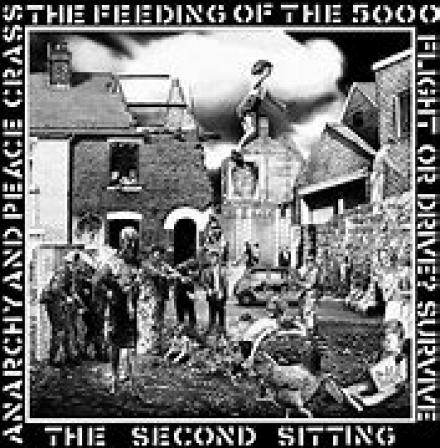
Steve Ignorant is as relevant now as in the days of Crass. More so, even. With all that has passed since the days of the late 1970s and early 1980s, the world should have learnt and moved on. Got better. But where are we? And why can’t we still can’t trust those in any position of power?
‘You don’t get me in the slaughterhouse,
You won’t hang me on your hook
I won’t be just another number to stick in your books.’
Taken from Slaughterhouse - Steve Ignorant’s Slice of Life, Just Another (2017)
Think for yourself and do not jump in with your eyes shut tight. Trust no-one.
Slice of Life, the final track on 2014’s Love and a Lamp-post, is a sweeping torrent that you never want to end.
I could go on. But what is so apparent is that the energy and ideology of Crass lives on, and Steve has given us a progress check on present day life and continues to inspire new anarchic, extreme music like Bob Vylan produce.
Check it all out for yourself.


